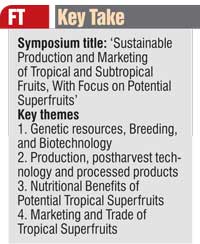Friday Feb 27, 2026
Friday Feb 27, 2026
Monday, 20 July 2015 00:00 - - {{hitsCtrl.values.hits}}
The 6th conference of the International Organization on Tropical Fruits is scheduled to be held from 3 to 6 August in Colombo.
The International Network for Tropical Fruits is a regional development body formed under the patronage of Food and Agriculture Organization of the United Nations.
Currently, 13 countries have obtained its membership. As fruit consumption level is less than the recommended level of the World Health Organization, special attention has been paid on the promotion of fruit cultivation.
This network is in operation for promotion production, productivity, processing, marketing, quality, consumption and international trade of fruits.
Cognizant of the market potential and demand of superfruits, the International Tropical Fruits Network (TFNet) and the Ministry of Agriculture, Sri Lanka, with the support of Food and Agriculture Organization of the United Nations and the Centre on Integrated Rural Development for Asia and the Pacific, is organising a symposium on ‘Sustainable Production and Marketing of Tropical and Subtropical Fruits, With Focus on Potential Superfruits’.
The event will conclude with a field trip to fruit farms in Sri Lanka.
The objectives of the symposium are: Highlight and share experiences on the latest research and development advances in production and postharvest technologies of potential superfruits; Discuss consumer demand, marketing, and trade and provide strategies to promote and market tropical and subtropical fruits as potential superfruits and Deliberate on policies that can enhance research, production, and marketing.
Developing countries, particularly in Asia, Latin America, and Africa, account for about 98% of global tropical and subtropical fruit production. In the last decade, international trade of these fruits has expanded dramatically as developing countries recognise the benefits of diversifying products. Initially, tropical and subtropical fruits command premium prices for being exotic.
As the market matures, consumers care less about novelty and demand high quality fruits that can provide beneficial effects to health and well-being. Certain high-end consumer groups are also open to new kinds of indulgence, instigating the research and development of “superfruit” products. While the term is still contentious among scientists and nutritionists, it has been proven as an effective marketing strategy.
A TFNet/FAO/Vietnam Ministry of Agriculture and Rural Development symposium on Superfruits held in Vietnam in 2013, concluded that some tropical and subtropical fruits can be labelled as ‘superfruits’ because they are rich in nutrients, micronutrients, dietary fiber as well as non-nutrient bioactive compounds.
Sustainable production and marketability of superfruits face challenges, including the increasing costs of farm inputs, availability of good quality planting materials, emergence of new and resilient pest and diseases, food safety regulations, postharvest losses and the effects of climate change. In the clinical and marketing aspect, the challenge lies in identifying the bioactive compounds that are present in tropical and subtropical fruits and providing scientific substantiation of the corresponding health benefits.